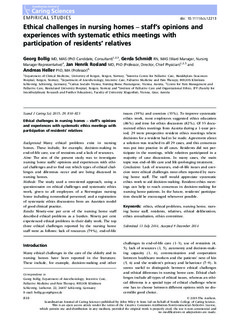Ethical challenges in nursing homes – staff's opinions and experiences with systematic ethics meetings with participation of residents’ relatives
Journal article

Åpne
Permanent lenke
http://hdl.handle.net/11250/2638087Utgivelsesdato
2015Metadata
Vis full innførselSamlinger
Originalversjon
Bollig, G. (2015b): Ethical challenges in nursing homes – staff’s opinions and experiences with systematic ethics meetings with participation of residents’ relatives. Scandinavian Journal of Caring Sciences 29(4), 810–23. https://doi.org/10.1111/scs.12213Sammendrag
Background
Many ethical problems exist in nursing homes. These include, for example, decision‐making in end‐of‐life care, use of restraints and a lack of resources.
Aims
The aim of the present study was to investigate nursing home staffs’ opinions and experiences with ethical challenges and to find out which types of ethical challenges and dilemmas occur and are being discussed in nursing homes.
Methods
The study used a two‐tiered approach, using a questionnaire on ethical challenges and systematic ethics work, given to all employees of a Norwegian nursing home including nonmedical personnel, and a registration of systematic ethics discussions from an Austrian model of good clinical practice.
Results
Ninety‐one per cent of the nursing home staff described ethical problems as a burden. Ninety per cent experienced ethical problems in their daily work. The top three ethical challenges reported by the nursing home staff were as follows: lack of resources (79%), end‐of‐life issues (39%) and coercion (33%). To improve systematic ethics work, most employees suggested ethics education (86%) and time for ethics discussion (82%). Of 33 documented ethics meetings from Austria during a 1‐year period, 29 were prospective resident ethics meetings where decisions for a resident had to be made. Agreement about a solution was reached in all 29 cases, and this consensus was put into practice in all cases. Residents did not participate in the meetings, while relatives participated in a majority of case discussions. In many cases, the main topic was end‐of‐life care and life‐prolonging treatment.
Conclusions
Lack of resources, end‐of‐life issues and coercion were ethical challenges most often reported by nursing home staff. The staff would appreciate systematic ethics work to aid decision‐making. Resident ethics meetings can help to reach consensus in decision‐making for nursing home patients. In the future, residents’ participation should be encouraged whenever possible.
Utgiver
Scandinavian Journal of Caring SciencesTidsskrift
Scandinavian Journal of Caring Sciences
Med mindre annet er angitt, så er denne innførselen lisensiert som Attribution-NonCommercial-NoDerivatives 4.0 Internasjonal
Beslektede innførsler
Viser innførsler beslektet ved tittel, forfatter og emneord.
-
Ethical issues in dementia care: making difficult decisions
Hughes, Julian C.; Baldwin, Clive (Book, 2006)There are always difficult day to day decisions to be faced when caring for a person with dementia - from knowing how to deal with wandering to end of life decisions. Many of these decisions are underpinned by value judgments ... -
Ethical dilemmas concerning autonomy when persons with dementia wish to live at home: a qualitative, hermeneutic study
Smebye, Kari Lislerud; Kirkevold, Marit; Engedal, Knut (Journal article, 2016)Omsorg for mennesker med demens som bor hjemme reiser etiske dilemmaer om hvordan balansere autonomi med sikkerhet og trivsel for den enkelte. Målet med denne studien var å undersøke etiske dilemmaer knyttet til autonomi ... -
Ethical decision-making in nursing homes: Influence of organizational factors
Dreyer, Anne; Førde, Reidun; Nortvedt, Per (Journal article, 2011)In this article we report findings from a qualitative study that explored how doctors and nurses in nursing homes describe professional collaboration around dying patients. The study also examined the consequences this can ...
